We may not have the course you’re looking for. If you enquire or give us a call on +40 316317743 and speak to our training experts, we may still be able to help with your training requirements.
Training Outcomes Within Your Budget!
We ensure quality, budget-alignment, and timely delivery by our expert instructors.

Europe is known around the world for the outstanding architecture that defines each country's unique culture. Whether it is the iconic Spanish Baroque style, or the distinctive Gothic style that can only be found in Romania, some of the most beautiful university buildings can be on the continent.
Europe is also home to some of the most prestigious learning institutions on the planet. That’s why The Knowledge Academy was keen to uncover just which of these universities was the most beautiful, according to the golden ratio.
What is the golden ratio?
The golden ratio is also known as the divine proportion, the golden proportion, or the golden number. It is a ratio between two numbers that equates to roughly 1.618. Skipping over all of the mathematical principles involved, the closer a ratio is to 1.618, the more pleasing on the eye it is. In the case of the following buildings, it is the ratio of width to height that makes them so gorgeous to look at.
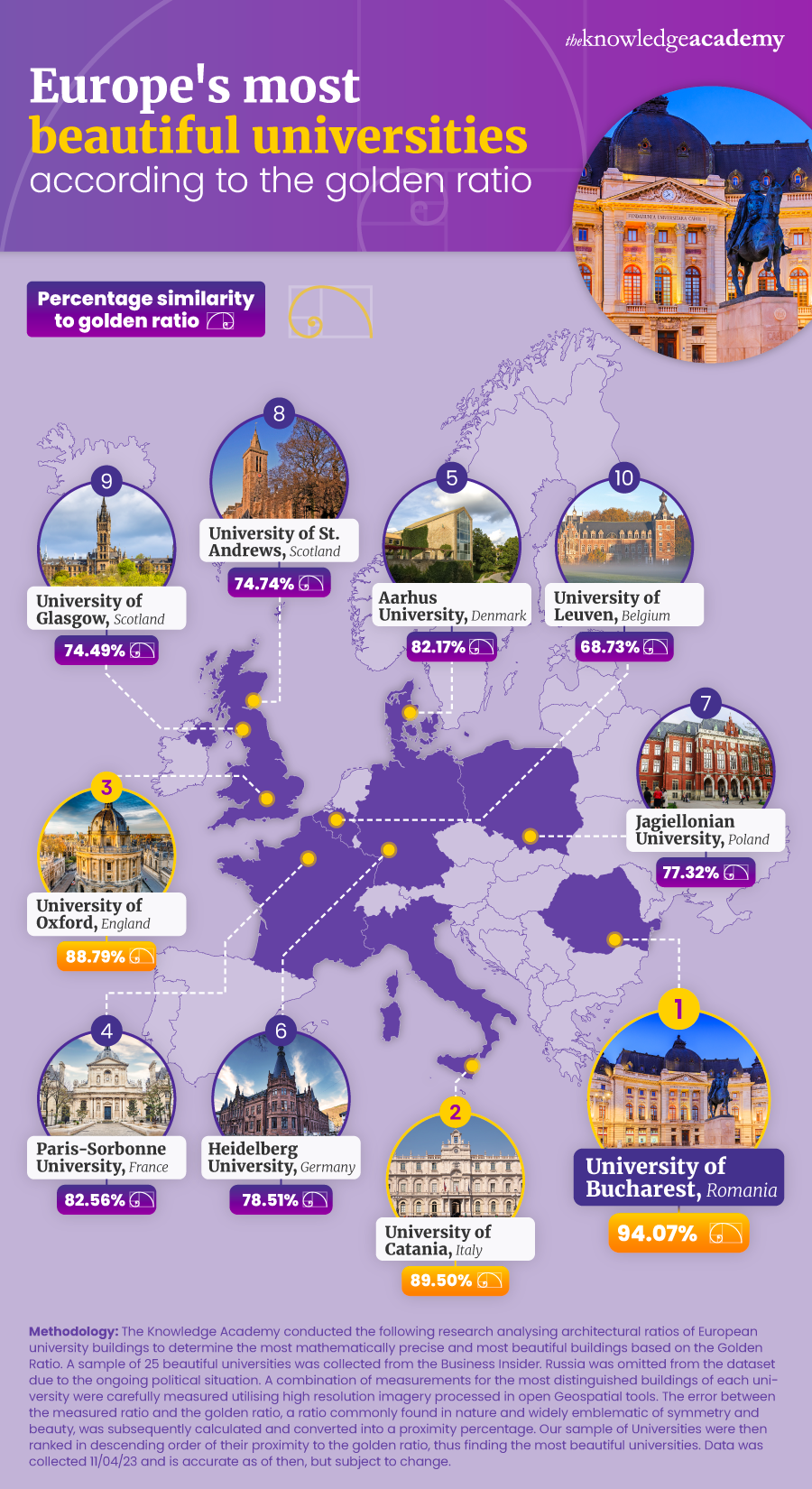
Top 10 most beautiful universities
1. Central University Library at the University of Bucharest
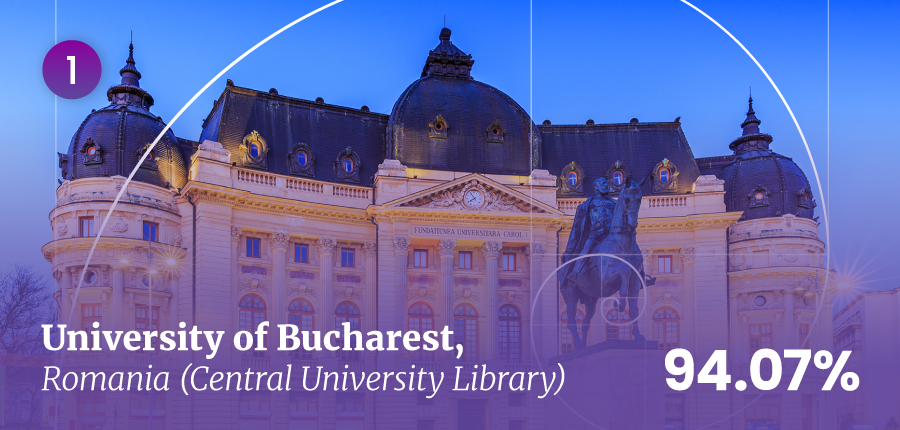
In first place on our list is the Central University Library, at the University of Bucharest in Romania. The stunning building was completed in 1893 and officially opened in 1895. The almost perfect balance between height and width makes it the closest building to matching the golden ratio.
It’s an awesome destination for travellers and tourists as it is one of the seven wonders of Romania. It is also right across the street from the National Museum of Art of Romania, making it a perfect location for sightseeing.
The library holds a high similarity percentage to the golden ratio, at 94.07%, making this the European building that is most pleasing to the eye.
2. Main Building of the University of Catania
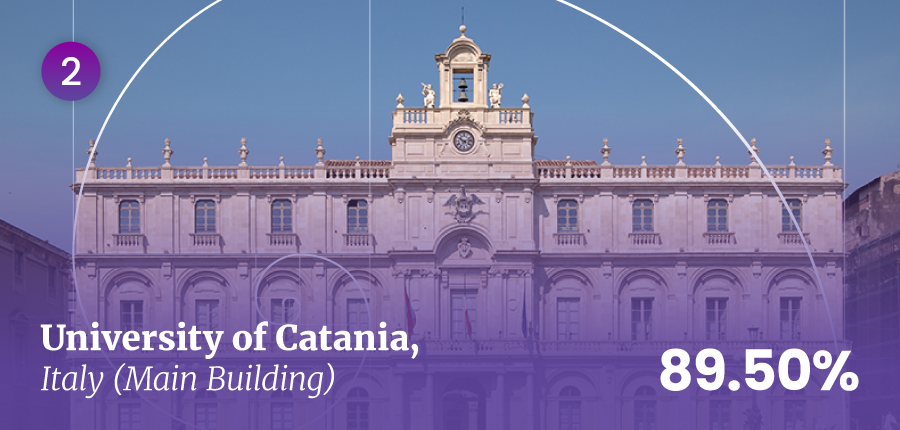
In second place is the main building of the University of Catania, in Italy. This beautiful baroque building was built following an earthquake in 1693, which saw its predecessor razed. The current iteration has seen many renovations and repairs over the years, most notably following another earthquake in 1818.
But these renovations have clearly done the trick in terms of the building’s aesthetics. At almost 52m wide and almost 30m tall, its measurements give a ratio of 1.7879.
With a similarity percentage of 89.5%, this stunning building fits the golden ratio almost perfectly, making it incredibly satisfying to look at.
3. Radcliffe Camera at the University of Oxford
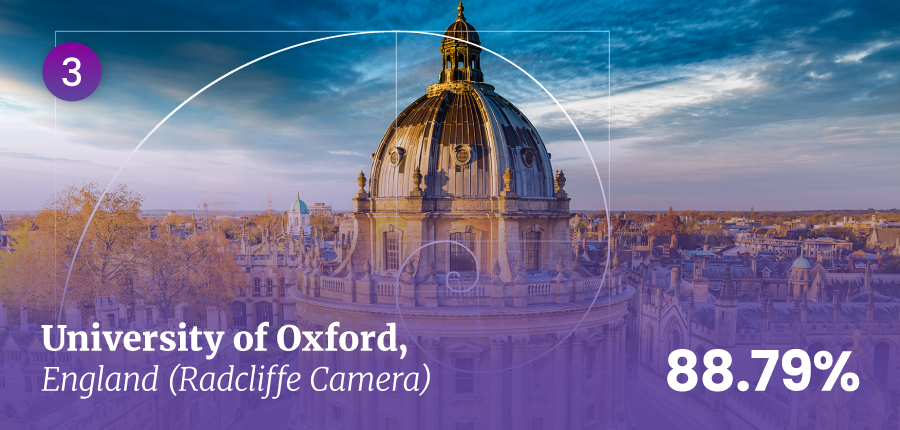
Third place belongs to the Radcliffe Camera at the University of Oxford in sunny England. Its name stems from the Latin word camera which means “room” — it has nothing to do with photographs short of starring in them, and from physician John Radcliffe who bequeathed the funds to build it on his passing. Opened in 1749, this stunning building is considered a main attraction on the University of Oxford campus.
Scoring 88.79% it follows closely behind the Main Building at the University of Catania. Along with the unusual and eye-catching shape, the ratio between the building’s width (32m) and height (46m) makes it interesting and appealing to look at.
Visitors and tourists might want to swing by after they’ve finished being spooked over at Oxford Brookes, one of the most haunted universities in the UK.
4. Sorbonne Building at Paris-Sorbonne University
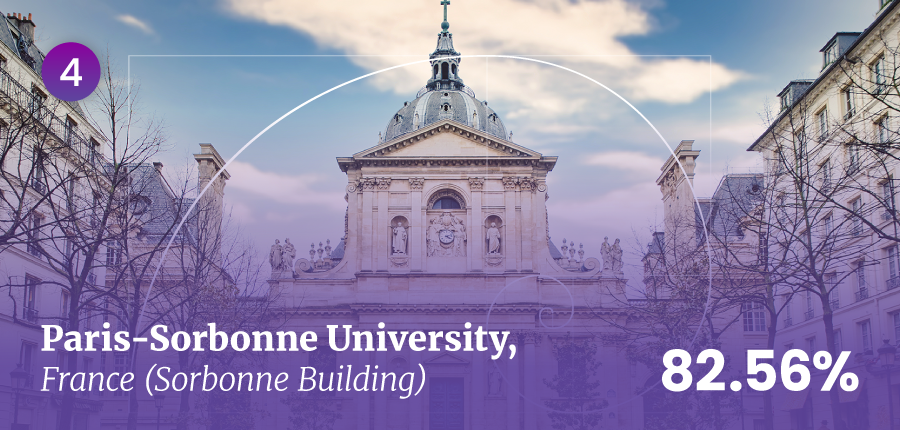
In fourth place is the Sorbonne Building, at Paris-Sorbonne University in France. The Chapel in particular is a Paris icon, which is impressive considering the sheer number of icons there are in the French capital. The University is the alma mater of some incredible alumni—Nobel prize-winning scientist Madame Marie Curie trod these hallowed halls, followed 100 years later by influencer and author Ayem Nour.
The Sorbonne building is truly beautiful from all angles, and this is down to its ratio similarity to the golden ratio. It’s almost perfectly half as wide as it is tall.
Scoring 82.56%, this stunning building is not only beautiful to look at but absolutely brimming with history.
5. Main Building of Aarhus University
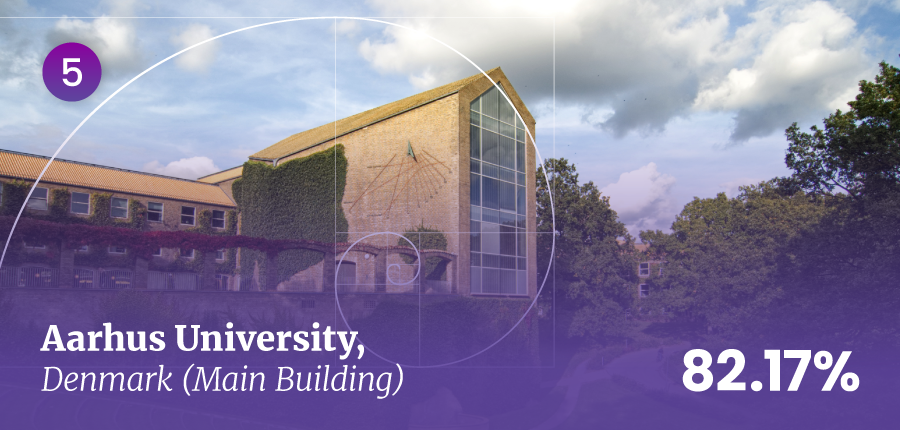
Rounding out the top five is the Main Building of Aarhus University in Denmark. Quite different from the previous four entries, this building was one of the first in Denmark in the Functionalist style of architecture. The building’s architecture is so significant that it is officially one of the twelve most significant architectural works in the cultural history of Denmark, making it perfect for tourists.
This building is not the only one in Denmark that we looked at, we also considered the main building for the University of Copenhagen. However, there isn’t really much of a comparison, as the University of Copenhagen scored only 14.27—that’s 67.9% less!
It isn’t surprising that such a beautifully and thoughtfully designed building matches so closely with the golden ratio. With a healthy score of 82.17%, the Aarhus University Main Building is a quirky but beautiful addition to the list.
6. University Library at the University of Heidelberg
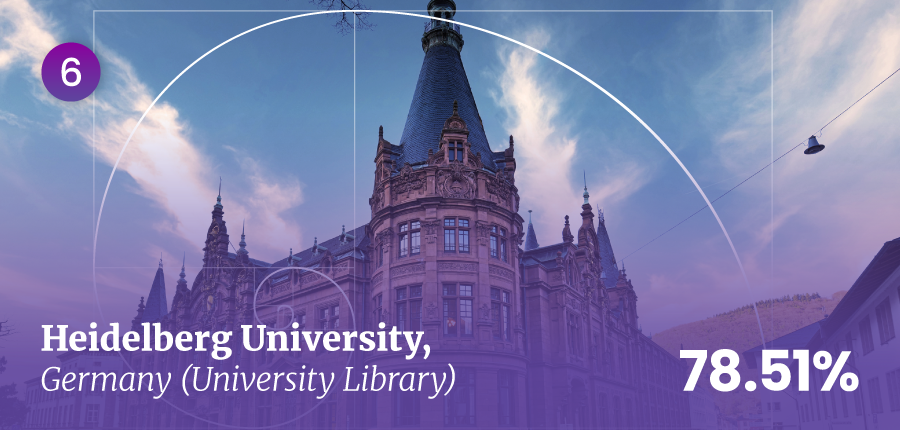
The University Library at the University of Heidelberg in Germany comes in sixth place on this list. It is one of the oldest buildings on this list, its founding year the same as the rest of the University of Heidelberg—1386. Along with its lengthy and illustrious history, the University has been home to many notable alumni. Romantic composer Robert Schumann attended, as did psychologist Wilhelm Wundt.
Its romantic, gothic fairytale-style architecture is a stark difference from the previous entry, but they are both close to matching the golden ratio. These are perfect examples of how different architectural families can be beautiful in their own ways.
With a score of 78.51%, this stunning historical site makes a worthy entry to the list.
We also looked at the Old Library at Humboldt University in Germany and, while charming, it scored abysmally. With -15.83%, the Old Library was so far removed from the golden ratio it actually earned a negative percentage, a huge 94.34% different from the University of Heidelberg.
7. Collegium Novum at Jagiellonian University
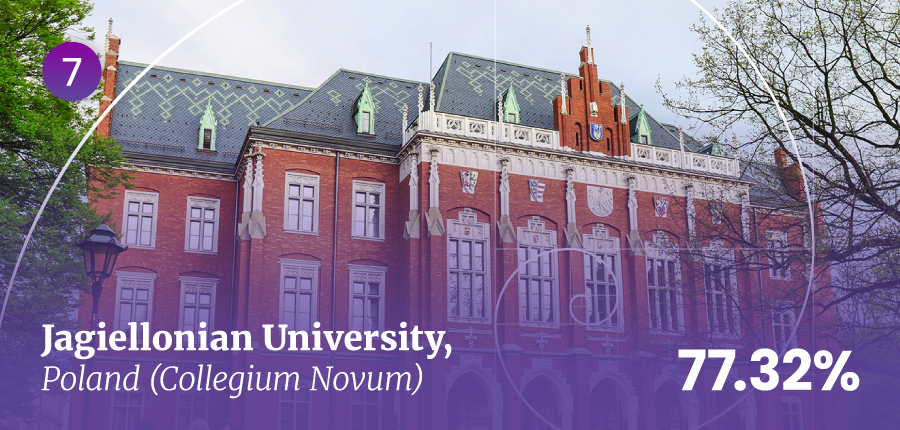
The Collegium Novum at Jagiellonian University in Poland lands in seventh position. Another golden oldie, this building was originally constructed between 1363 and 1365, before being destroyed. It was then rebuilt in the late 19th century to match the oldest buildings on campus. This building, in the city of Krakow, is filled with history which makes it perfect for any history buffs. A plaque in an upstairs room serves as a remembrance of the Nazi action “Sonderaktion Krakau” which saw 183 professors arrested and sent to concentration camps.
Despite some of the dark history and almost austere facade, it is still a stunning building that closely follows the golden ratio. Its width is almost double that of its height, and it has a ratio of 1.985. This means it earns a score of 77.32%.
8. St Salvator’s Chapel at University of St Andrew’s
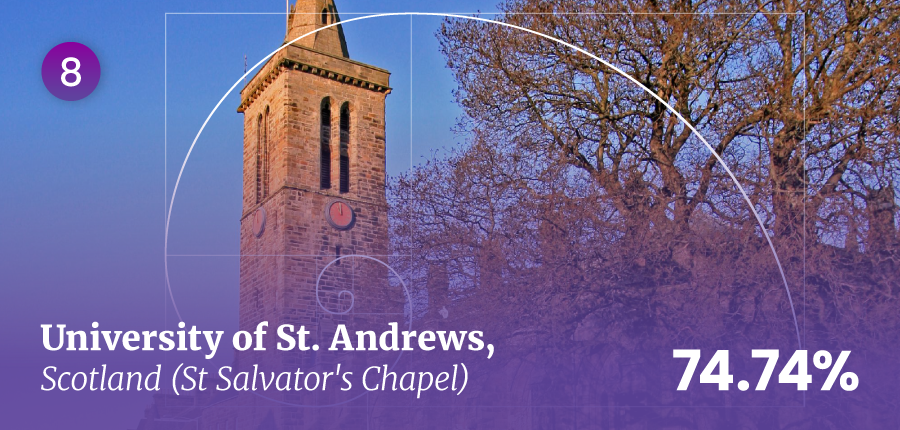
Eighth position on the list goes to St Salvator’s Chapel at the University of St Andrews in bonny Scotland. Founded in 1450, and refurbished frequently in the centuries that have passed since, the chapel was constructed in the late Gothic architectural style. The university the chapel is based in has played host to reels of incredible alumni, including Prince William and Catherine, the Duke and Duchess of Cambridge. Benjamin Franklin also received an honorary degree from the university in 1759.
Unlike others on this list, the height-to-width ratio is surprisingly close at 44m to 53m respectively. However, with a score of 74.74%, St Salvator’s Chapel makes a gorgeous, and ancient, addition to the list.
9. Gilbert Scott Building at the University of Glasgow
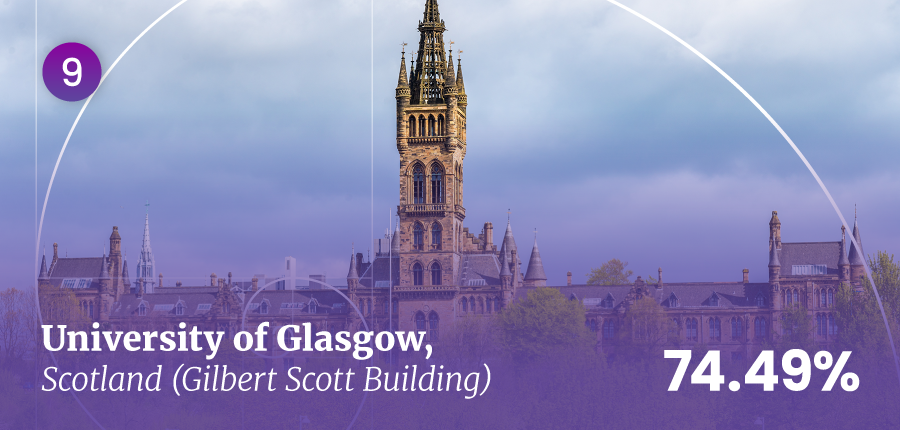
We stay in bonny Scotland for the penultimate position on our list, moving over to the University of Glasgow and the Gilbert Scott Building. As the main building of the university, the Gilbert Scott Building (named for its designer Sir Gilbert Scott) is home to the tower that has become one of Glasgow's greatest landmarks.
It’s also by far the largest building on the top 10—over 164m wide and 81m tall, it’s more than twice the size of the next biggest building. But size doesn’t matter when it comes to the golden ratio, which it matches closely.
Scoring 74.49%, the Gilbert Scott Building comes just a hair’s breadth behind St Salvator’s Chapel at St Andrew's.
10. Arenberg Castle at the University of Leuven
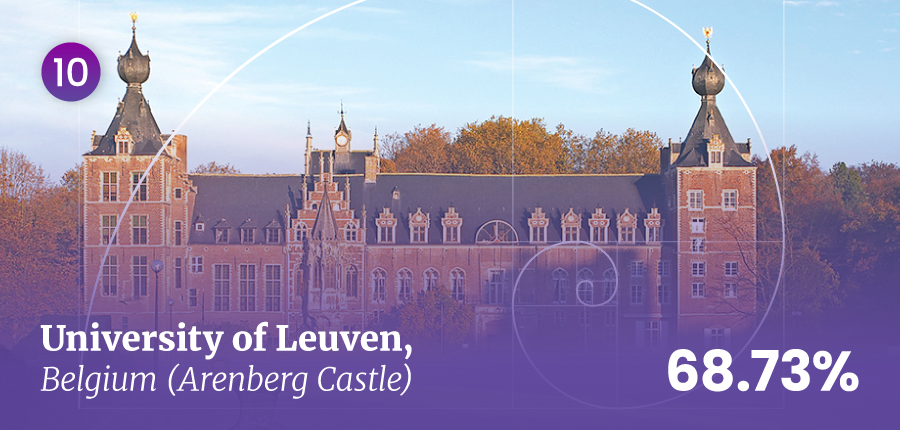
Final position in our top ten list belongs to Arenberg Castle, which is part of the University of Leuven in Belgium. A chateau, built on the site of a 12th-century medieval castle that gave it its name, Arenberg Castle was commenced in the 16th century but has received many updates and renovations in the centuries spanning since.
All of these adjustments have resulted in a building that has a width of just over 70m and a height of 33m, which gives it a ratio of 2.124, which is a significantly wider ratio than the rest of our top 10.
Scoring 68.73%, the castle falls quite a way behind the rest, though it is still a stunning example of Flemish architecture.
Country with the most beautiful universities
England vs Scotland
From the seed list of 25 beautiful university buildings, it quickly became apparent that two countries were home to more of these buildings than any other. This raised the question of which country, on average, was home to the most beautiful university buildings—England, or Scotland?
England
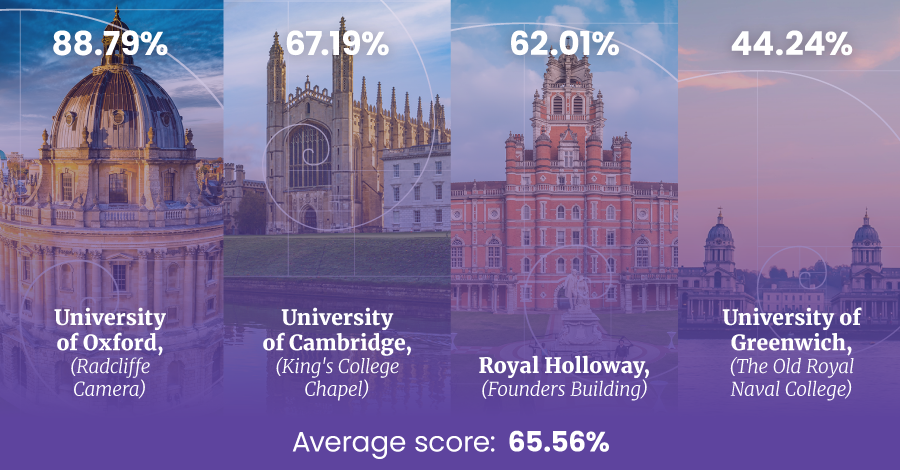
England is home to the stunning Radcliffe Camera at the University of Oxford, as we’ve previously covered, which scored 88.79%. But it is also home to three further gorgeous buildings.
The first of these is King’s College Chapel, at the University of Cambridge. This stunning religious building is regarded as one of the finest examples of late perpendicular gothic architecture. It’s almost twice as tall as it is wide, with a height of 43m and a width of just over 20. This gives it a score of 67.19%, and it is hard to believe it somehow missed out on the top 10.
The next English location is the Founder’s Building at Royal Holloway. Opened by Queen Victoria herself in 1886, the building is home to a picture gallery containing historical artworks and a beautiful chapel. The Founder’s Building is one of the larger on our list, with a width of almost 76m and a height of 34m. This gives the building a ratio of 2.23 and a score of a respectable 62.01%.
Finally, the third building in England that is regarded as incredibly beautiful is the Old Royal Naval College, at the University of Greenwich. This architectural masterpiece has been recognised by the United Nations Educational, Scientific and Cultural Organisation (UNESCO) as a site of “Outstanding Universal Value”. With a ratio of 2.32, it scores 44.24%, it is a stunning piece of art and history that shouldn’t be overlooked.
The average score across the English beautiful buildings is a respectable 65.56%, but will that be higher than the combined average of the Scottish buildings?
Scotland
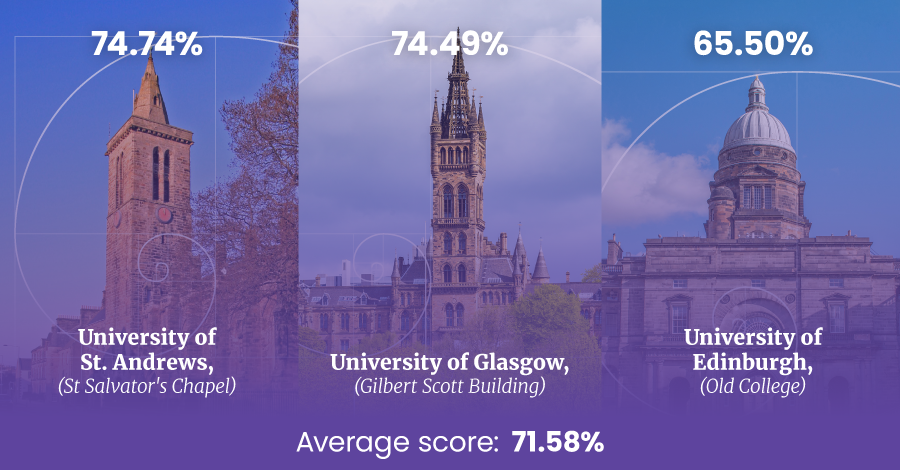
Scotland is home to three buildings from our seed list, which is one less than England, but two of these are included in our top 10. St Salvator’s Chapel at the University of St Andrews and the Gilbert Scott Building at the University of Glasgow scored 74.74% and 74.49% respectively.
But Scotland is also home to the Old College at the University of Edinburgh. Not just one of the best universities for finding love, it is home to the Old College, located on South Bridge. This late 18th/early 19th-century building is grade A listed and currently home to university administration, the University of Edinburgh Law School and the famous Talbot Rice gallery. The Old College has a width of 45.29m and an eerily close height of 48m, which means it scores a healthy 65.50%, and missed out on our top 10 by a very narrow margin.
The average combined score of these Scottish buildings is a huge 71.58%, which means Scotland is crowned the proud winner of European country with the most beautiful university buildings.









 If you wish to make any changes to your course, please
If you wish to make any changes to your course, please


